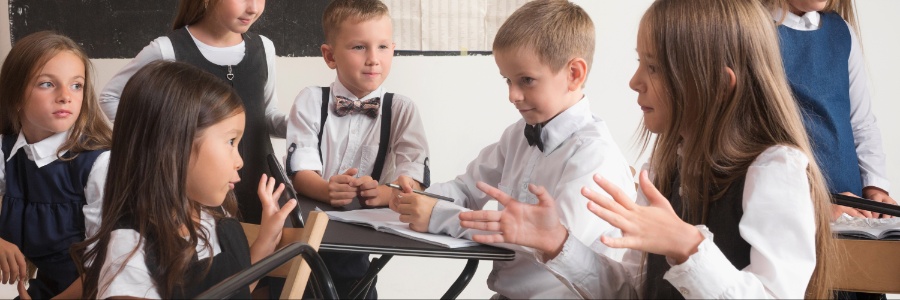Home / Parents / Child development / Private vs Public Schools in North Miami Beach: The Pros and Cons
Private vs Public Schools in North Miami Beach: The Pros and Cons
Choosing the right school for your child is one of the most important decisions a parent can make. With so many options available, it can be a daunting task to choose the best fit. Private schools and public schools offer two distinct educational paths, each with its own unique benefits and drawbacks.

The terms “private school” and “public school” refer to the type of funding that these institutions receive. Public schools are funded by taxpayers’ money, while private schools rely on tuition fees from students or donations from individuals or organizations. This difference in funding structure can actually mean considerable differences in educational opportunities within both types of schools.
Ultimately, choosing the right school for your child depends on many personal factors such as cost and preferred learning style. Having a clear understanding of each option will help make an informed decision regardless of whether you decide upon a private or a public institution for your child’s education in North Miami Beach.
Differences between Private and Public Schools
Public schools often have larger enrollments than private schools because they do not require tuition payments. They are usually bound by the same regulations as other public accounts, meaning that spending is closely monitored and sometimes limited due to budget constraints.
Despite this, public schools have immense purchasing power. In North Miami Beach, public schools take advantage of this situation by offering a wide range of classes, activities and sports programs free of charge.
In contrast, private schools are often more expensive than their public counterparts but they include additional services such as smaller class sizes and extracurricular activities not available at public institutions. Private school teachers tend to have higher credentials than those in public education which contributes to an overall improved quality of instruction in many cases.
Private schools also tend to be more flexible when it comes to curriculum design allowing them to offer unique subjects not taught in traditional classrooms such as foreign languages or religious studies. This extracurricular focus is attractive for some parents looking for specialized learning experiences for their children.
Benefits and Drawbacks of Attending Private Schools in North Miami Beach
When it comes to choosing a school for children, parents in North Miami Beach have a number of options. Private schools offer an attractive alternative to the public education system and account for nearly 15 percent of all students enrolled in the city. Although private schools come with some drawbacks, they generally offer more benefits than public schools.
1. Higher academic standards
Private schools generally have much higher academic standards than public schools. They are known for offering rigorous curricula and providing rich learning experiences that prepare students for college or other forms of post-secondary education.
Many private schools also have high graduation rates and provide excellent opportunities for advanced coursework and extracurriculars that may be lacking in public institutions. Private schools also offer more specialized programs, such as Advanced Placement classes, career-based electives, and enrichment activities like foreign language classes and music or art instruction.
2. Small class sizes and personalized attention
Private schools typically offer smaller class sizes – usually 12 to 16 students per session – which means that each student receives personalized attention from their teachers during their educational journey. This level of hands-on instruction ensures that every student is able to get the help they need when they need it in order to master challenging material.
Furthermore, these smaller classes create an environment characterized by camaraderie and collaboration between students which can extend beyond classroom walls into extracurricular activities.
3. Flexibility in curriculum and teaching methods
In addition to small class sizes, private schools also benefit from having the flexibility to design unique curriculums tailored to the needs of their student body as well as offering innovative teaching methods that allow for greater creative expression among learners.
This kind of custom approach often translates into better retention of educational material due to its relevance for individual lifestyles rather than relying on standard textbook-based syllabi which can become stale after repeated exposure year after year.
4. Strong emphasis on discipline and character development
Fourth, many private schools emphasize character development as much as academic achievement by weaving concepts such as respectfulness, accountability, self-discipline, integrity, and compassion into their lesson plans.
This type of well-rounded development is important for cultivating young minds into responsible citizens capable of making meaningful contributions to society while still maintaining a sense of moral purpose on their own life path that transcends what is taught in typical classroom settings like those found in most state-funded learning institutions.
5. Opportunities for religious education
Last but not least, private schools give parents the opportunity to provide religious curriculum through facilities such as parochial or Sunday School programs integrated within the standard instruction day or at times outside regular school hours (e.g. Bible study).
 Drawbacks of Private Schools in North Miami Beach
Drawbacks of Private Schools in North Miami Beach
Private schools in North Miami Beach have some drawbacks, but overall, they provide quality education and many other benefits to their students.
Private schools are known for their strict behavioral expectations. Though some families may view this as a negative, these rules can help create an environment where focused learning is encouraged, which can benefit students academically.
Even though there may be higher tuition costs associated with private school attendance, many private institutions award scholarships or tuition assistance programs to families who demonstrate financial need. Additionally, many private schools also offer flexible payment plans that help ease the burden on parents looking to afford quality education for their children.
Benefits and Drawbacks of Attending Public Schools in North Miami Beach
Public schools in North Miami Beach offer a great educational opportunity for residents, but there are also several potential downsides to consider. This section covers the pros and cons of public schooling in North Miami Beach so that families can make informed decisions about the best education choices for their children.
1. Free education
One of the main advantages of public schools is that they are free. Families don’t have to invest funds up front as they do with private schools, which can make them more accessible to families who might not otherwise be able to afford quality schooling options.
2. Diversity of student population
Another upside is that public schools tend to be very diverse. Since they often draw students from a wide range of backgrounds, public school students gain exposure to different cultures, religions, and ways of life, which is an invaluable experience that helps students become better global citizens.
3. Availability of government funding for resources and technology
In addition, because the government provides funding for public schools, resources and technology tend to be more advanced than those offered at private schools. These funds help provide access to excellent teachers and staff with specialized expertise as well as state-of-the-art equipment used by high-performing districts across the country.
Drawbacks of Public Schools in North Miami Beach
One major downside is large class sizes and limited individual attention. When classes are overcrowded or teacher-student ratios are out of balance, it can lead to suboptimal learning outcomes as teachers have too many students to manage on top of their regular teaching duties.
In addition, another disadvantage is limited flexibility in curriculum and teaching methods. Because all public school curriculums must adhere to district standards guidelines, teachers may not have the freedom to explore alternative teaching styles or go deeper into certain topics than allowed by those standards. This could create challenges for students with unique learning needs or pace preferences who could benefit from a more personalized approach instead.
Finally, safety and security can be contentious issues in some areas. The quality of safety measures taken by individual schools can vary dramatically depending on which district they’re located in, leading some parents to opt out altogether if they don’t feel comfortable sending their children into an uncertain environment every day.
Factors to consider when choosing a school
When it comes to choosing the right school for your child, there are many factors to consider. Location, curriculum, extracurricular activities, and the overall environment are all important factors. No matter which type of school you decide on, public or private, it is essential that you visit the schools in person, meet with staff and faculty, and get a sense of what the school can offer your child.
 Academic needs and goals of the student
Academic needs and goals of the student
When it comes to academic needs, private schools may offer more resources such as smaller class sizes, higher-quality instruction, specialized classes, and access to additional services like tutoring or counseling.
Families should consider their child’s individual needs and make sure that the school is able to meet them with appropriate programs. Private schools often bring a higher level of college preparation than public schools do. This should also be taken into consideration when making a decision about where to enroll your child.
Family’s financial situation
The financial situation of the family is obviously an important factor in choosing a school. Private schools typically require tuition fees that not all families may afford.
However, many private schools offer scholarships and financial aid packages to help offset costs. It is always worth exploring all potential options before ruling out private schools entirely due to budgetary concerns.
School culture and values
Finally, what kind of culture does the school prioritize? The culture of any school should reflect its mission statement, whether that includes religious education or specific educational goals such as STEM curriculum development or art appreciation classes. If it speaks to you, then it is one worth considering.
Private institutions tend to have strong cultures rooted in traditions and communities which makes them attractive to many parents who want their children exposed to those kinds of experiences from an early age.
In conclusion, there are many benefits to attending either a private or public school in North Miami Beach. Private schools offer smaller class sizes, higher curriculum standards and greater tuition support for families who qualify. Public schools offer larger classes, more diverse learning opportunities and lower tuition costs. Ultimately, choosing the right school for your child is a personal decision that should take into account your family’s budget, academic standards and educational aspirations.
At our private school in North Miami Beach, we strive to provide an excellent education in a nurturing environment. We encourage parents to call us if they would like more information or would like to schedule a tour of our campus. With small class sizes and qualified instructors, we are confident that our students will develop the skills necessary to become successful lifelong learners.



 Drawbacks of Private Schools in North Miami Beach
Drawbacks of Private Schools in North Miami Beach Academic needs and goals of the student
Academic needs and goals of the student




